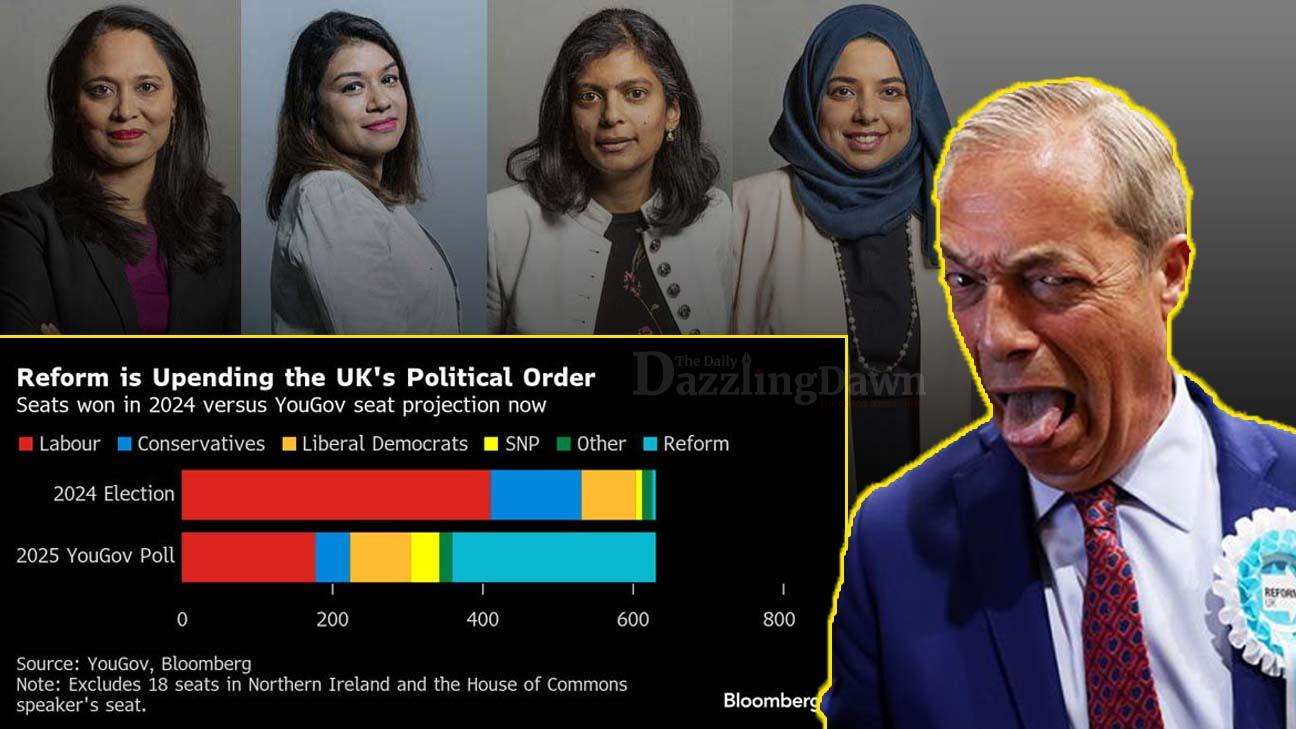A YouGov poll published Thursday has ignited a fierce debate within the British political arena, forecasting that Nigel Farage’s Reform UK party could emerge as the largest force in the House of Commons if a general election were held today. This dramatic prediction sees Reform poised to win 271 of 652 seats – significantly more than Labour’s projected 178 and leaving the Conservatives trailing far behind with just 46. It signals profound public discontent with the established political system. While the next general election is still some years away, the survey raises critical issues for the future of parliamentary representation, particularly for London's vibrant British Bangladeshi, Muslim, and broader immigrant communities.
Four British Bangladeshi MPs at Risk
London stands as one of the UK’s most diverse constituencies, its population significantly shaped by immigrant communities. As of mid-2023, over 40% of London's residents were non-UK born. The 2021 census revealed that 1.2 million Londoners were born in Asia, 600,000 in Africa, and 1.3 million in Europe (excluding the UK). This demographic reality means the capital's electoral outcomes are increasingly influenced by the diverse voting patterns of its multicultural populace.
The British Bangladeshi community, a significant demographic force, especially in Bangladeshi-majority East London, has historically been a strong pillar of the Labour Party. The 2021 census counted 652,535 British Bangladeshis in the UK, with 322,054 (nearly 50%) residing in Greater London. In Tower Hamlets, for example, the Bangladeshi population constitutes 33% of its total residents, reflecting the community’s strong political engagement here.
This demographic strength has translated into significant parliamentary representation, with four British Bangladeshi women currently serving as Labour MPs in London: Rushanara Ali, MP for Bethnal Green and Bow since 2010; Apsana Begum, MP for Poplar and Limehouse since 2019; Rupa Huq, MP for Ealing Central and Acton since 2015; and Tulip Siddiq, MP for Hampstead and Kilburn since 2015.
These MPs represent constituencies that have historically been Labour strongholds. Their victories in past elections were primarily driven by the Labour Party’s robust party vote bank rather than solely individual charisma. However, the YouGov poll's forecast of a national decline for the Labour Party suggests that even these well-established figures could face tougher contests in future elections. A decrease in Labour’s national vote share could erode their majorities, making these seats more vulnerable to challenges from any strong party, including Reform UK.
The prediction that Labour and the Conservatives will collectively secure only 41% of the vote (down from 82% in 2017) points to a volatile and shifting electorate actively seeking alternatives to the two dominant parties. Significantly, Apsana Begum, MP for Poplar and Limehouse, recently faced challenges within the Labour Party. Her parliamentary whip was withdrawn in July 2024 after she voted for an amendment to scrap the two-child benefit cap, effectively suspending her from the Labour Party. Although she was re-elected with a reduced majority in the 2024 general election, the whip withdrawal clearly indicates she will not receive official Labour Party nomination for the next general election. This situation could see her run as an independent candidate. Recent local election successes in East London, often driven by local discontent with mainstream parties and specific issues like the conflict in Gaza, highlight this potential.
The Rise of Independents and Reform’s Strategy in East London
With Labour and the Conservatives projected to collectively gain only 41% of the vote (down from 82% in 2017), the fragmentation of votes signals a volatile electorate seeking alternatives. In various boroughs across East London, this discontent has already manifested in the success of independent candidates in local elections. These independent campaigns have garnered strong support within the British Muslim and British Bangladeshi communities, focusing on local grievances and international concerns such as the situation in Gaza.
In the next election, there’s a strong possibility that, as in the past, some British Muslim and British Bangladeshi aspiring MPs could contest East London seats as independents, capitalising on this unstable electoral environment and aiming to attract voters disillusioned with Labour. The phenomenon of "lottery ticket" candidates, who enter the electoral race at the last minute to gain publicity or test the waters, is a long-standing feature of East London politics that has further divided communities. Past elections have shown how Bangladeshi voters in East London have, at times, opposed each other.
While these candidates often do not pose a primary threat to the frontrunners, their presence can significantly impact the overall vote, potentially making a difference in tight contests.
Nigel Farage's Reform UK is acutely aware of London’s diverse demographics and the potential for a "flow of voters" from disaffected communities. To attract immigrant communities, particularly British Asian and Muslim voters, Reform is actively seeking to field candidates from these backgrounds. The appointment of British Muslim Zia Yusuf as Reform UK's former chairman was a clear indication of this intent. Though Yusuf has since resigned, this strategy points to Reform's ambition to broaden its appeal beyond its traditional base. It's plausible that Reform UK will continue to back British Bangladeshi or British Muslim candidates in East London and other diverse constituencies, presenting a more inclusive image while remaining steadfast on their core platform.
Reform's Core Platform: Immigration and Benefits – Its Impact on BAME Communities
Reform UK's electoral strategy is heavily reliant on its stringent stance on immigration and welfare reform, policies that could significantly impact BAME communities.
- Immigration Freeze: Reform proposes a "net zero" immigration policy, aiming to drastically reduce overall numbers. This would directly affect family reunification, skilled worker visas, and entry for international students, impacting individuals and families from South Asian and African countries who constitute a significant portion of new arrivals. In 2023, net international migration to London was estimated at 154,000, with a substantial number of arrivals from South Asian and African nations. A freeze would significantly curb this inflow.
- Increased Barriers to Permanence and Citizenship: Reform plans to extend the minimum residency period for settlement to 10 years (currently 5 years for many routes) and link it more closely to "contributions to the UK economy and society." This would make it considerably more difficult and lengthy for immigrants from BAME backgrounds to gain permanent residency and citizenship.
- Benefit Restrictions: The party advocates for new immigrants to require five years of residency and employment before claiming benefits, which could place substantial strain on new arrivals and their support networks within existing BAME communities.
- Public Service Cuts: Reform's broader agenda of "slashing waste" and implementing "large, unspecified cuts to public services" could disproportionately affect BAME communities. Various studies show these communities often experience higher rates of deprivation and are more reliant on public services due to socio-economic factors. For instance, data indicates specific BAME groups experience higher poverty and unemployment rates than their white British counterparts.
The Path Forward for BAME Communities
The rise of Reform UK presents a significant challenge and potential shift for British African, British Pakistani, British Indian, British South Asian, and other BAME communities. While some individuals may align with specific Reform policies, particularly those focused on fiscal responsibility or a strong national identity, the party’s core tenets on immigration and welfare could lead to increasing difficulties for new arrivals and potentially a less inclusive societal discourse.
The YouGov poll indicates a highly fragmented political landscape, where traditional loyalties are weakening. How London's diverse communities, including the influential British Bangladeshi voters, navigate and shape this new political reality will be crucial. The next general election, whenever it is held, will not only determine the next government but also the future direction of a diverse and evolving Britain, where the voices and political choices of immigrant communities will play an increasingly decisive role.








.svg)
